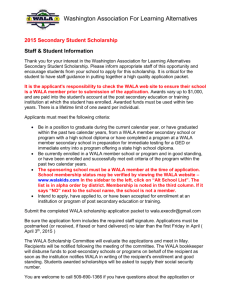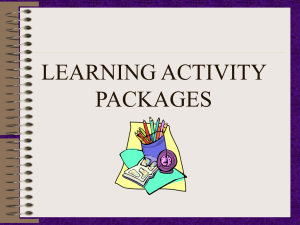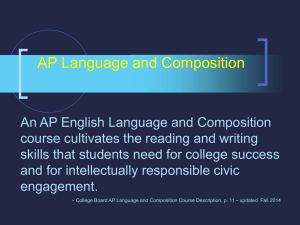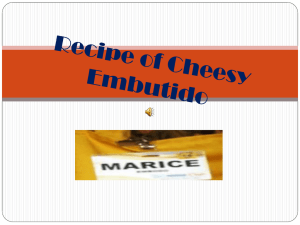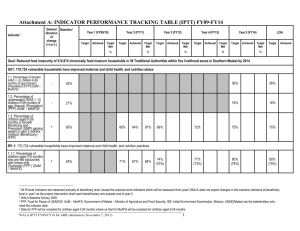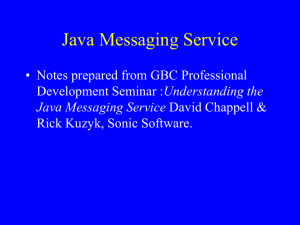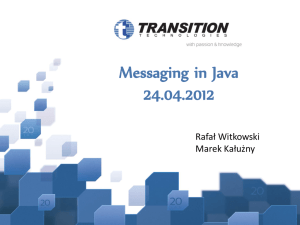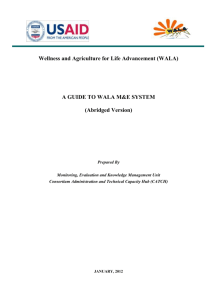Homework #3 Discussion
advertisement
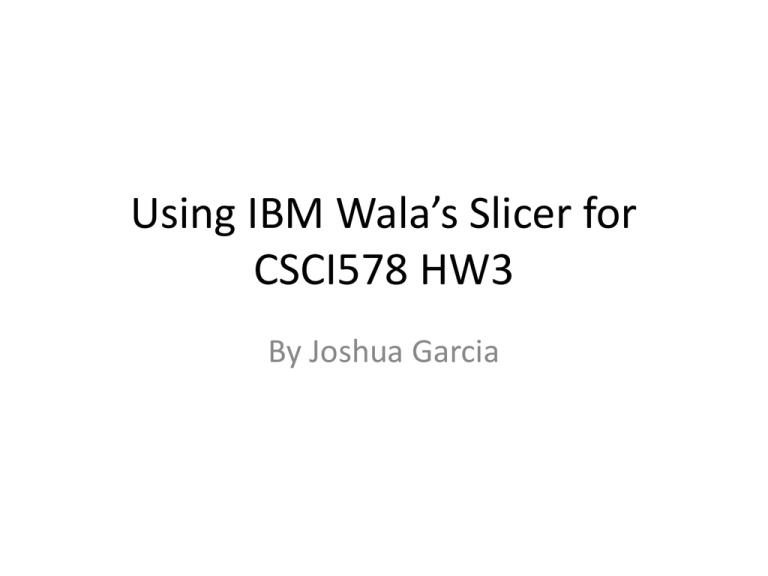
Using IBM Wala’s Slicer for
CSCI578 HW3
By Joshua Garcia
Some Requirements
• Eclipse IDE
• SVN or Git Plugin for Eclipse (e.g. Subclipse at
http://subclipse.tigris.org/)
Getting the IBM Wala code
• Check out all com.ibm.wala* projects form the
trunk of the repository EXCEPT for
com.ibm.wala.core.tests
• Import com.ibm.wala.core.tests from the zip
file we provide
• Reference
– A more general guide to starting with Wala:
http://wala.sourceforge.net/wiki/index.php/User
Guide:Getting_Started
Possible Building Problems
• Some of the projects will have errors. I have errors in the
following Wala projects:
–
–
–
–
com.ibm.wala.cast.js.rhino.test
com.ibm.wala.cast.js.test
com.ibm.wala.ide.jsdt
com.ibm.wala.ide.tests
• However, you won’t be using all the code so it shouldn’t be
a problem
• However, you should set your JDK compiler compliance
level to 1.6
– Click Window -> Preferences
– Java -> Compiler
– Set Compiler compliance level to 1.6
Configuring Properties Files
• Go to this page:
http://wala.sourceforge.net/wiki/index.php/User
Guide:Getting_Started
• Follow the section called “Configuring WALA
properties”
• Wait there’s more and it’s IMPORTANT – You
need to set some properties in
dat/wala.examples.properties as well
– Just copy the wala.example.properties.sample file and
rename it
A Little About Slicing Before We
Continue
• Given a statement and a subset of its
variables, you can perform forward or
backward slicing
• A slice is a set of statements that affect or are
affected by the selected statement
• Forward slicing gives you the statements
affected by your selected statement
• Backward slicing gives you the statements that
affect the given statement
More on slicing, If You Are Interested
• http://www.grammatech.com/research/paper
s/slicing/slicingWhitepaper.html
• http://en.wikipedia.org/wiki/Program_slicing
Time To Slice Some Programs
• You should be able to run our customized PDFSliceMod
drivers
• There are three launcher configuration you can modify
and run as needed (one for each DEB application):
– PDFSliceMod KLAX
– PDFSliceMod specjms from stmts file
– PDFSliceMod stoxx
• Simple way to get to these launcher configurations
– Click Run -> Run Configurations
– Under Java Application select the appropriate launcher
configuration
Customizing the launcher
configuration
•
•
•
The launcher configuration takes a few arguments
You can see these arguments from the Arguments tab of the launcher
configuration
For example, for PDFSliceMod KLAX, here are the arguments
– -appJar ${workspace_loc}/com.ibm.wala.core.tests/apps/c2fw-original.jar -sliceCritFiles
"${workspace_loc}/com.ibm.wala.core.tests/c2fw-mda-task0-search-deps-stmts.txt" -dd
"no_base_no_heap" -cd "none" -dir "backwards" -pkgIncludes "Lc2/apps/klax"
•
The arguments and what they do
–
–
–
–
–
–
appJar, the jar of the DEB application (no need to change it)
srcCaller, the method you will create the slice from
sliceCritFiles, file name of the file containing the input statements to the slicer
dir, “forward” or “backward” slice
pkgIncludes, which packages to analyze and show for output
For the remaining options take a look at
http://wala.sourceforge.net/wiki/index.php/UserGuide:Slicer
•
•
•
You may not need to change dd or cd, unless you think it will give you more accurate results
Changing dd or cd can make your program running for a very long time
A slicer on our DEB applications can take minutes to run
Understanding the console output
• The slicer’s analysis starts from entry points in your
program, which are set to all the methods of your selected
class
• One statement can be broken up into multiple IR
statements. For example line 70 of KLAX’s ChuteArtist class
is made up of these statements (and some null
statements):
– 70 18 = invokevirtual < Application, Lc2/fw/Notification,
getParameter(Ljava/lang/String;)Ljava/lang/Object; > 2,16 @22
exception:17
– 70 19 = checkcast <Application,Ljava/lang/Integer>18
<Application,Ljava/lang/Integer>
– 70 21 = invokevirtual < Application, Ljava/lang/Integer,
intValue()I > 19 @28 exception:20
More on console output
• You get the statements of the slice and corresponding line numbers (if applicable):
Printing slice with node number and line number:
SLICE:
Node 2 corresponds to line 66 of
ChuteArtist
1, -1 NORMAL_RET_CALLER:Node: < Application, Lc2/apps/klax/comp/ChuteArtist,
handle(Lc2/fw/Notification;)V > Context: Everywhere[1]5 = invokevirtual < Application,
Lc2/fw/Notification, name()Ljava/lang/String; > 2 @1 exception:4
2, 66 NORMAL handle:8 = invokevirtual < Application, Ljava/lang/String, equals(Ljava/lang/Object;)Z >
5,6 @8 exception:7 Node: < Application, Lc2/apps/klax/comp/ChuteArtist,
handle(Lc2/fw/Notification;)V > Context: Everywhere
3, -1 PARAM_CALLER:Node: < Application, Lc2/apps/klax/comp/ChuteArtist,
handle(Lc2/fw/Notification;)V > Context: Everywhere[5]8 = invokevirtual < Application,
Ljava/lang/String, equals(Ljava/lang/Object;)Z > 5,6 @8 exception:7 v5
4, 74 NORMAL handle:12 = invokevirtual < Application, Ljava/lang/String, equals(Ljava/lang/Object;)Z >
5,10 @56 exception:11 Node: < Application, Lc2/apps/klax/comp/ChuteArtist,
handle(Lc2/fw/Notification;)V > Context: Everywhere
5, -1 PARAM_CALLER:Node: < Application, Lc2/apps/klax/comp/ChuteArtist,
handle(Lc2/fw/Notification;)V > Context: Everywhere[29]12 = invokevirtual < Application,
Ljava/lang/String, equals(Ljava/lang/Object;)Z > 5,10 @56 exception:11 v5
Node
Numbers
Some IR statements have no
corresponding line number
How to read your slice
Printing slice with selected statements only:
Lorg/spec/jms/eventhandler/sp/SP_CallForOffersEH:306 NORMAL handleMessage:4 = instanceof 2
<Application,Ljavax/jms/TextMessage> Node: < Application,
Log/spec/jms/eventhandler/sp/SP_CallForOffersEH, handleMessage(Ljavax/jms/Message;)V >
Context: Everywhere
Lorg/spec/jms/eventhandler/sp/SP_CallForOffersEH:306 NORMAL handleMessage:conditional
branch(eq) 4,5 Node: < Application, Lorg/spec/jms/eventhandler/sp/SP_CallForOffersEH,
handleMessage(Ljavax/jms/Message;)V > Context: Everywhere
Lorg/spec/jms/eventhandler/sp/SP_CallForOffersEH:308 NORMAL handleMessage:19 = checkcast
<Application,Ljavax/jms/TextMessage>2 <Application,Ljavax/jms/TextMessage> Node: <
Application, Lorg/spec/jms/eventhandler/sp/SP_CallForOffersEH,
handleMessage(Ljavax/jms/Message;)V > Context: Everywhere
Lorg/spec/jms/eventhandler/sp/SP_CallForOffersEH:308 NORMAL handleMessage:21 = invokeinterface
< Application, Ljavax/jms/TextMessage, getText()Ljava/lang/String; > 19 @12 exception:20 Node: <
Application, Lorg/spec/jms/eventhandler/sp/SP_CallForOffersEH,
handleMessage(Ljavax/jms/Message;)V > Context: Everywhere
Lorg/spec/jms/eventhandler/sp/SP_CallForOffersEH:308 NORMAL handleMessage:invokevirtual <
Application, Lorg/spec/jms/eventhandler/sp/SP_CallForOffersEH,
parseMessage(Ljava/lang/String;)V > 1,21 @17 exception:22 Node: < Application,
Lorg/spec/jms/eventhandler/sp/SP_CallForOffersEH, handleMessage(Ljavax/jms/Message;)V >
Context: Everywhere
Class Name
Line No.
More Stuff You Might Need to Know
• How slices map to line numbers:
http://wala.sourceforge.net/wiki/index.php/U
serGuide:MappingToSourceCode#From_Slices
_to_source_line_numbers
• Understanding the IR:
http://wala.sourceforge.net/wiki/index.php/U
serGuide:IR
Eclipse’s Reference-finding Feature
• Right click on method, variable, class, etc.
– Select References -> Project, Hierarchy,
Workspace, or Working Set
– You get list of references to your selection
• Or simply highlight the method, variable, class
etc.
– Press Ctrl+Shift+G
